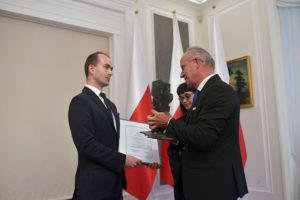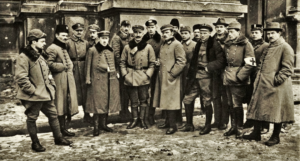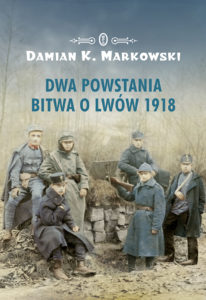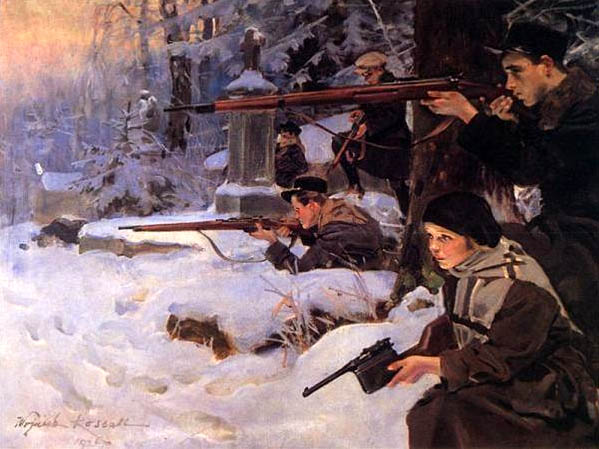Multi-nationality is an integral part of the landscape of Central and Eastern Europe. I really wished to avoid writing a one-dimensional book based on one narrative, even if it coincided with the way my compatriots would like to see the events of 1918 in Lwów, says Damian Markowski, the author of the book about Polish-Ukrainian conflict of 1918. Lwów is a city with a rebellious nature, he concludes.
polishhistory: When writing about the Polish-Ukrainian conflict over Lwów, you stated that this event ‘constitutes a kind of milestone’ in the history of Poland. What makes this conflict so significant?
Damian Markowski: When considering Lwów, we must be aware of the city’s importance not only for the history of Poland, but also for all of Eastern Europe. For Poles, deprived of their own state after the partition of Poland by Russia, Prussia and Austria, Lwów became the cultural capital and cradle of national life. Here, within the university walls, future elites were educated, this is where the celebrities of art and culture were meeting, and among those gathering secretly underground, the dream of an independent Poland was universal and vivid. When at the end of the Great War, it became clear that Austria and Germany would lose, and that Russia was revolution-torn and on the edge of collapse, the Poles understood that the time for the fight for independence had come. That is why Lwów was seen as an important and inseparable element of the future Polish statehood. When the young Western Ukrainian state also reached out for Lwów, conflict was inevitable, especially since the Ukrainians viewed Lwów as their Piedmont – a springboard to nationhood. For both national communities, Polish and Ukrainian, the conflict immediately assumed a nationalist dimension. Lwów was the spiritual capital of the Polish lands, and at the same time the potential capital of Western Ukraine, and as such, it was extremely important for both sides.

How tragic was is that neither side would back down?
Neither the Poles nor Ukrainians could imagine that the city would not eventually belong to their own newborn state. No agreement could be reached, despite so many bonds between the two communities. As a result, the battle for the city in November 1918 was, in fact, the beginning of a bloody Polish-Ukrainian civil war. A most terrible war, because there are no worse wars than those in which neighbours fight each other. This was a war that could only have one winner, and it was the Polish state that won in the end. Although a century has passed, the fact these events still retain such importance for both Poles and Ukrainians testifies to the ongoing conflict between these two nations over which of them has the right to call Lwów ‘theirs’.
The title of the book mentions ‘two uprisings’ – why?
In the last days of October 1918, the Austrian state was falling apart. German civil servants were leaving Eastern Galicia, and desertion was common within this multinational army. At that time, a secret Ukrainian Military Committee was operating in Lwów. Its members, Ukrainian officers from the Austrian army and officers of the Legion of Ukrainian Sich Riflemen, wanted to take over Lwów and claim it as the capital of the West Ukrainian state. The military coup took place at night, from 31 October to 1 November, and was totally successful. In the morning, Lwów was already in the hands of the newly formed Ukrainian army without any blood being shed.
But then the first shots were fired on the streets. Polish underground organizations, which until then had been quite passively waiting for Lwów to be taken over by the emerging Polish state, were spurred into action. At first, resistance was extremely chaotic, often it was led by individual fighters, sometimes students and academics, and often street children. Lwów was then a city with a majority Polish population that was brought up reading books on national heroes and famous historical events by Henryk Sienkiewicz. Polish young people were extremely patriotic during this time and they viewed the Ukrainian coup was yet another occupation of their beloved city. The first resistance organizations soon emerged. While in the first morning, the Ukrainian army struggled with a few dozen fighters, over the course of the next two days the number would increase to more than three thousand. This was a real uprising.

Hence, the book is essentially about two uprisings. The first is the Ukrainian uprising, formally aimed against the dissolving Austro-Hungarian empire, but in truth an attempt to seize Lwów before the Poles. The second uprising was a Polish uprising in the name of independence, in order to recapture Lwów from the Ukrainians.
Was a peaceful solution to this conflict possible?
It seems that a peaceful resolution of the conflict was out of the question when both Poles and Ukrainians were unable to accept the possibility of giving up the city. Although both sides declared that under their rule all other nationalities would be treated with full respect for their rights, nobody was appeased. Ukrainians, the vast majority of the inhabitants of the Galician province, did not want to be part of the Polish state. In turn, the Poles, who dominated the elites, and were located predominantly in Lwów and the larger cities, did not intend to give up either their position or the areas which they believed belonged to the newly revived Poland for historical reasons.
In 1918, Lwów was still known as Lemberg, a city under the Habsburg administration, inhabited not only by Poles and Ukrainians, but also by – among others – Jews and Germans. What was their attitude to the Polish-Ukrainian conflict?
Let’s begin with the Germans. Their attitude to the conflict, when it turned into an armed struggle, was quite clear from the very beginning. As soon as they could collect their families, and their valuables, they left. This departure was welcomed and assisted by both the Ukrainians and the Poles. However, a few chose to remain – mainly individual military units – that decided to serve in the new Ukrainian army. In November 1918, the Jews, who, after the Poles, constituted the largest number of Lwów residents, declared that they would remain neutral during the conflict. A committee was created to represent Jewish interests in the city, as well as a self-defense brigade – a Jewish militia. The problem was that, as days passed, members of the militia gradually became more and more involved as a fighting group, negating their claim to neutrality. It was partly justified – some Polish fighters, the so-called street people, did not shy away from plundering the Jewish quarter. Thus, Jews had a total right, and even duty, to defend themselves. The thing is that they also took part in regular battles on the Ukrainian side, including during the general assault on the northern parts of the city. Their militia also committed crimes against Polish prisoners of war.

What happened when the Poles managed to take over the city?
The recapturing of Lwów from Ukrainian hands was a huge victory for the Poles, but was also the beginning of a tragedy. The Jewish militia was not notified by the Ukrainian general staff about the retreat of their defeated troops. As a result, on 22 November, shots were still being fired at Polish troops. The Jews had no chance of fighting the Poles alone. Then a pogrom began in the Jewish district of Lwów, defenseless people were murdered and women were raped; houses and temples were burnt and plundered. This pogrom which would last almost two days, left 79 people dead. The Polish command, still dominated by the supporters of national democracy, did not do much to prevent these atrocities. Bloody revenge for the actions of a few individuals, therefore, fell upon the entire Jewish community of the city, regardless of the fact that there were many Jewish volunteers in Poland who had shed blood for the country. For them, the pogrom was a double shock; this was not the Poland they were fighting for.
The Lwów pogrom was a war crime. Despicable to its core and harmful to Poland itself for its violence against defenseless people, often women and children. This is a black card in the golden book of the Polish Defense of Lwów and it was the original sin of the Second Polish Republic. It also foreshadowed the fact that this new Poland would constantly struggle with intolerance, anti-Semitism and a lack of acceptance for its minorities. Ultimately, this intolerance would wreck the idea of any peaceful coexistence between Poles and Jews, Ukrainians and Belorussians. And twenty years later, in September 1939, this antagonism would bear tragic fruit, the treason of national minorities during the Soviet Union’s attack on Poland, which was already defending itself against Nazi Germany.
From the point of view of more powerful states, the fighting for Lwów took place on the periphery of Europe. What information did the West receive from the Polish-Ukrainian battlefield?
The events on the Polish-Ukrainian ethnic border usually reached the West press in a biased, distorted form. The news reports were centered on the Lwów pogrom – carried out by the Polish Army and those fighting on the streets which left 79 dead and several hundred wounded. The information printed in the West alleged that thousands had been killed. Of course, this affected the international perception of the young Polish state. Liberal Europe also did not endorse the Polish approach to the issue of the eastern states, which Poles considered to be a strictly internal problem. The western countries wanted Poland to guarantee national freedoms for minorities. At the same time, they feared that Poles would lean towards imperialist tendencies and try to rebuild their country at the expense of other Eastern European nations, particularly the Ukrainians and Lithuanians.

On the other hand, however, the Poles, as allies of France, were in a much better position than the Ukrainians, who had sinned by co-operating with the defeated Germans. They were judged from the perspective of the Treaty of Brest-Litovsk, when the Germans guaranteed the creation of a subordinate Ukrainian state. It should also not be forgotten that representatives of the Polish elite usually knew French, and sometimes also English. And this was not just the politicians, but also the officers. This had a significantly beneficial influence on the Entente peacekeepers and their opinions.
The so called ‘Lwów Eaglets’ (‘Orlęta Lwowskie’) entered history during the battle of Lemberg. Who were they and how to explain their phenomenon to a person of the 21st Century?
I will try to use a simple comparison. We speak now in Warsaw at the end of the second decade of the 21st Century. Let’s imagine that suddenly the city is in danger because someone has decided to seize it, capture it, and from an emotional point of view – hurt us. In order to defend it, to defend this place of our own, our community, where we grew up and where we live our everyday lives, the city’s young people decide to join the battle en masse and in doing so abandon their schools, responsibilities, and affairs. This is the phenomenon that took place in Lwów a hundred years ago. Those young people were in their own world. Complaints were common then about these, supposedly, spoiled and vicious young people. Of course they should not be considered angels – they were human. But they were aware of their identity, culture, nationality and social responsibilities. Basically, when there was a need for sacrifice, they were ready. And many of them came from both intellectual and wealthy families. They did not have to take such a step – yet they did. There were 1,476 young people, most of them children, on the Polish side, who took part in the battle for Lwów. The youngest was no more than eight years old.
Are they the perfect material for a legend?
The legend of the ‘Eaglets’ is based on the fact, romantic in its interpretation, that when the true test came, these children defended their city. Not an imaginary city, or a mythical one, but just their home: their own yard, their own house, their own street. If we add that many young volunteers died in defense of Polish Lwów in the years 1918-1920, we understand how the legend of the ‘Eaglets’ was created and why the Polish state worshipped them. There is a well-known case of four brothers, natives of Lwów, who each died a hero’s death. Their mother buried each one month after month, and year after year. One died in November 1918, and the other a month later, during the Ukrainian siege of the city. The last two were killed two years later, in the summer of 1920, when a battalion of the Polish Army – at the price of its total destruction – held off the ten times larger Red Army on the road to Lwów over the course of one day. State propaganda could not fail to take advantage of such dramatic examples of patriotism and sacrifice.

The English translation of your book will soon be released. Why would you recommend an English-speaking reader read this book by Damian Markowski?
Multi-nationality is an integral part of the landscape of Central and Eastern Europe. I really wished to avoid writing a one-dimensional book based on one narrative, even if it coincided with the way my compatriots would like to see the events of 1918 in Lwów. Such a story would be fundamentally false, superficial, and one-sided. Therefore, I hope that readers who reach for this book will receive the most objective story possible, and at the same time – that they will discover a fragment of an unusual Lwów as seen through the prism of several nationalities. Lwów is a city with a rebellious nature, a city whose history cannot be told only from one perspective.
Interviewer: Michał Przeperski
Translation: Alicja Rose & Jessica Sirotin





